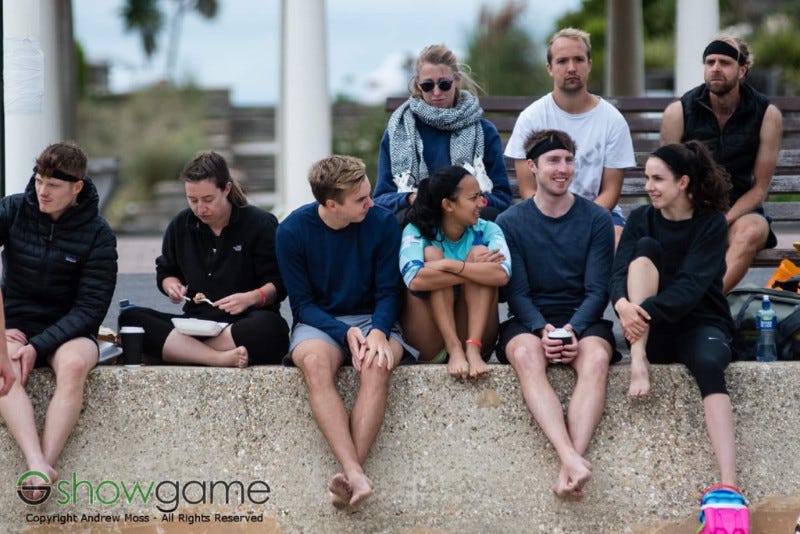#94: Overwhelming Kindness + Frisbee Fotos + Victor Frankl

Happy Friday!
Everyone knows that it's nice to be kind, but the Prof taught me something interesting: it's even nicer to be overwhelmingly kind, to be so intensively kind on one single day that it blows your little mind.
That makes sense: if you spread your kindness thinly over the course of a week, you might forget the flavour - like the scraping of butter that's senselessly lost in the riot of a bacon and egg bap.
In the same way, your moments of kindness will be diluted during the week by all the other occasions when you were a douche, or just being 'normal'.
But if you save your week's worth of buttery kindness for one huge dollop on, say, a Friday, then all of a sudden you become - albeit briefly - hot butter spread thickly on a crumpet. An unforgettably kind kind of god.
Of course, different people have different baseline kindness. We're talking about kindnesses that you wouldn't ordinarily perform.
For example, on Wednesday I let a woman go in front of me in the queue because she had... fewer items in her basket than I did. That's a kindness I never would have normally performed, so that counts.
But that same evening, I volunteered with a gaggle of other GoodGym runners at a community garden in Bournemouth. That's no doubt a kind deed, but it doesn't count because I would've done that anyway - it didn't require any effortful kindness on my part. Baseline.
I can easily tell these two varieties of kindness apart: the first gives me a buzz of almost electrifying, almost illicit pleasure. As I turned to the woman behind me, I thought to myself: Oh my god, I'm such a queue rebel! Is this even legal? This is going to blow her MIND!
As it happened, she just said thanks and walked in ahead of me with her Dairylea Lunchables. But I can't control that. You are what you repeatedly do: I became in that moment a little more of a kindly person. And, like the bleeding heart liberal that I am, I think that is a goal worth pursuing.

Episode 1 is GONE already :(
Don't miss Episode 2 (The Miles Jupp One)
Episode 3 (The Boyzone One)
Episode 4 (The Ralf Little One)
IMPORTANT: If you want to hear more from Foiled next year, then we really bloody need you to tweet about the show. Yes, really: this is how showbiz works. @bbcradiowales will do the job - THANKS!

I've published 527 Things on my blog. Here's one from the archives...
Murakami on Writing and Running
March 27, 2010
Murakami is a writer (and runner). That, according to the final pages of this book, is how he would like to be remembered on his tombstone. And, according to the vague thesis of this book, writing and long-distance running are not dissimilar. In fact, Murakami says that everything he knows about writing, he learnt from running.
So what was that?
Murakami identifies the three most important character traits for a novelist to possess:
Talent.
Focus. Murakami works for 3 or 4 hours in the morning. During this time he is totally focussed on his work-in-progress. He doesn’t think about anything else at all.
Endurance. A novelist needs the energy to focus every day for 6 months, a year or 2 years at a time.
Continue reading on davidcharles.info...
>> INPUT
[ARTICLE] Why you should give money directly and unconditionally to homeless people (New Statesman) YES.
[ARTICLE] How friendships change over time in adulthood (The Atlantic)
[VIDEO] Death and stuff with Sam Harris.
[VIDEO] Thighs of Steel: Week 5 (Sorry - last last time!)
[PODCAST] Paul Stamets talks about mushrooms on The Joe Rogan Experience. Absolutely superb stuff, with thanks to the Human Lizard for sending my way.
OUTPUT >>
The Victor Frankl 5-a-Day Book Cult: Day 19 (September)
Thighs of Steel: A Community on Wheels (September)
Crossing the Border (August)
...COMING UP...
A long walk in the Brecon Beacons, with a compass and a map.
A recording of the excellent Robin Morgan's Home for Radio Wales - you're invited too!
Now On: The Victor Frankl 5-a-day Book Club!
Membership Criteria: Read 5 pages a day of Man's Search for Meaning to complete the whole darn text in only 28 days. I'll be tootling through the text at just 5 pages a week, so you've got plenty of time to catch up online.
Day 20
Today's pages mark the beginning of the second part of Man's Search for Meaning: Logotherapy in a nutshell.
After some apologies for the inevitable failures for compressing into a few pages that which 'required twenty volumes in German', Victor Frankl sets about explaining his therapy.
Logotherapy (as its etymology indicates) attempts to confront the patient with and reorient him towards the meaning of his life. Frankl is very insistent that this 'will to meaning' is the overriding motivation for human beings: we live and die for our meanings and values, he points out.
Furthermore: 'This meaning is unique and specific in that it must and can be fulfilled by him alone; only then does it achieve a significance which will satisfy his own will to meaning.'
As we saw in the earlier pages of the book, it is through its uniqueness to us that our meaning gains its power. Our meaning can only be pursued by ourselves: it is our unique contribution to humanity and the universe. We are vital.
But, as we all well know, '[m]an's will to meaning can also be frustrated'. Frankl calls this 'existential frustration' and it can cause what psychotherapists call neuroses.
However, these are not the 'normal' neuroses of conflicts between drives and instincts. These are 'noogenic' neuroses and can be resolved only by the search and discovery of meaning in life. This is not something that involves digging back into one's early childhood.
Indeed, Frankl is quite dismissive of such futile efforts. 'Not every conflict is necessarily neurotic,' he writes, 'some amount of conflict is normal and healthy.' Phew.
'A man's concern, even his despair, over the worthwhileness of life is an existential distress, but by no means a mental disease.'
Again: phew!
---
We continue next week...
If you enjoy what you read in this newsletter, you could do me a massive favour by sharing it on your networks. [Here's an easy, self-aggrandising link for you to Tweet] I'd love to write to more people!
(And if you don't enjoy what you read in this newsletter, I'd love to know why not!)
Much love,
- dc
CREDITS
David Charles wrote this. David is co-writer of BBC Radio sitcom Foiled, does copywriting for The Bike Project and is pretty much always available for work. davidcharles.info // @dcisbusy

Badass.


